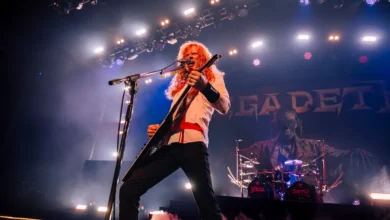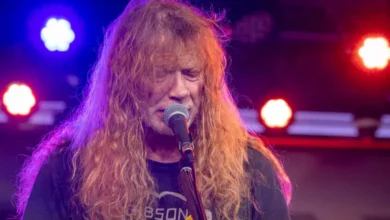Metallica Sets Elton John’s Classic Ablaze with a Powerful Performance at the Gershwin Prize
Metallica and Elton John stand as titans in their respective musical worlds—one forged in the fires of heavy metal, the other carved in the timeless melodies of pop and rock. Yet, earlier this year at the Gershwin Prize ceremony, those two worlds collided in spectacular fashion. Metallica boldly chose to reinterpret two of Elton’s most heartfelt songs, creating a breathtaking fusion that blurred genre lines. With Elton sitting front and center, the band unleashed a blazing version of “Funeral for a Friend / Love Lies Bleeding” from *Goodbye Yellow Brick Road*, leaving the audience completely captivated.
In pure Metallica fashion, the band didn’t simply cover the medley—they completely transformed it. Their performance pulsed with unrelenting energy, giving the classic track a fresh identity without losing its emotional core. It was both an homage and a reinvention, showcasing the band’s ability to channel reverence through raw power. James Hetfield’s gravelly voice soared over the guitars, grounding the song in gritty authenticity while infusing it with the spirit of heavy metal’s golden age.
The audience could feel every note reverberate through the walls as Metallica’s sound wrapped itself around Elton’s intricate melodies. The unlikely marriage of piano-born emotion and thundering riffs created a sensory overload that was impossible to ignore. Elton John’s expression said it all—equal parts awe, delight, and pride—as he watched his composition take on a completely new form. The performance became a living bridge between generations of music lovers, uniting fans who might never have shared the same playlist before.
When Hetfield’s vocals rose above the storm of guitars, the crowd could sense something historic unfolding. Lars Ulrich’s pounding drums and Kirk Hammett’s screaming guitar lines reshaped the composition’s cinematic structure into something fierce yet beautiful. It was proof that even the most delicate ballads can survive—and thrive—when reimagined through the lens of a different genre. Metallica didn’t just reinterpret Elton John; they honored him by amplifying the emotion that was already there, transforming nostalgia into raw modern power.
The synergy between the band and the song’s orchestral roots gave the performance a grand, almost spiritual resonance. What started as a tribute quickly turned into a shared musical celebration. Fans who had grown up on Metallica’s thunderous anthems stood side by side with lifelong Elton admirers, all swaying together to a sound that merged elegance and chaos. It was an emotional reminder that music, no matter the genre, speaks the same universal language of connection and passion.
The sight of Elton John smiling as Metallica tore through the medley became one of the night’s defining images. He appeared genuinely touched, clapping along as his masterpiece was reborn in front of him. The respect between the artists was palpable, carried by every chord and every glance exchanged on stage. For those in attendance, the performance was a once-in-a-lifetime moment—a crossroad where two legacies met, each amplifying the other in pure harmony.
By the time the last echoes faded, the hall erupted into thunderous applause that felt more like gratitude than celebration. This wasn’t just a band playing another song—it was an exchange of admiration between icons, a reminder that influence moves both ways. The moment proved that music’s true power lies in its ability to transcend style, age, and expectation, uniting even the most unlikely of creative forces under one roof.
Held at Washington, DC’s historic DAR Constitution Hall on March 20, 2024, the Gershwin Prize ceremony served as the perfect stage for Metallica’s fiery homage. When the performance was later shared online, it quickly amassed over 1.3 million views, igniting discussions across fan communities. Many listeners noted that the song’s raw, textured sound evoked the intensity of Metallica’s mid-1990s era, with some comparing it to hidden gems from their *Load* sessions—a sound both polished and primal, emotional yet explosive.
For Metallica, this collaboration wasn’t just a spur-of-the-moment decision. Their admiration for Elton John had already been well documented. In 2021, during a memorable appearance on *The Howard Stern Show*, Elton unexpectedly called in while the band was being interviewed. He lavished praise on “Nothing Else Matters,” calling it “one of the greatest songs ever written.” The look of shock and emotion on Hetfield’s face spoke volumes—this was validation from one legend to another, a moment that cemented mutual respect between two giants of modern music.
The Gershwin Prize itself was awarded this year to Elton John and his legendary songwriting partner Bernie Taupin, recognizing their unmatched contribution to popular music. The evening turned into a gathering of icons, with tributes pouring in from Joni Mitchell, Garth Brooks, Brandi Carlile, Charlie Puth, Annie Lennox, Maren Morris, Billy Porter, and Jacob Lusk of Gabriels. Each brought a different interpretation of Elton’s work, but Metallica’s heavy-metal salute stood out as the boldest gesture of the night—one that perfectly captured the essence of creative fearlessness.
Among Elton and Taupin’s vast collection of songs, “Funeral for a Friend / Love Lies Bleeding” has always held a special place. The medley’s sweeping structure and emotional storytelling make it a fan favorite, a seamless fusion of instrumental drama and lyrical catharsis. Metallica’s choice to perform it was no accident—it mirrored their own passion for epics that evolve and explode, echoing their signature approach to long-form songwriting that builds intensity through layers of melody and emotion.
Originally released as the opening track on Elton John’s 1973 double album *Goodbye Yellow Brick Road*, the medley set the tone for one of the most acclaimed records in rock history. Its soaring introduction and deeply introspective lyrics encapsulated both grandeur and vulnerability, qualities that Metallica naturally connected with. The song’s orchestral ambition found a new form in Metallica’s hands—its elegance replaced by power, its melancholy reimagined as defiance, yet its heart completely intact.
“Funeral for a Friend” began as Elton’s private reflection on mortality—music he envisioned for his own funeral. The emotional complexity of that idea made the song timeless, even though its eleven-minute runtime kept it from radio playlists. For Metallica, that introspection offered the perfect canvas to explore their own recurring themes of life, death, and endurance. Their rendition didn’t just amplify the volume; it amplified the meaning, reminding everyone that true music never fades—it only finds new voices to keep it alive.





